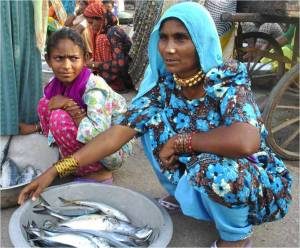
Women fish traders, India. Photo: ICAR “Gender in Fisheries: A Future Roadmap”
Getting gender into the fisheries and aquaculture agenda requires large and fundamental changes inside the organisations that support the sector, including the research institutes. Last year, the fisheries institutes of the Indian Council for Agricultural Research (ICAR), one of the world’s largest agricultural research systems, held a pioneering workshop to plan a future roadmap for their gender in fisheries work. Dr B. Meenakumari, the Deputy Director General (Fisheries) for ICAR, recently alerted genderaquafish.org that the report of the workshop and its outcomes is now published.
The report, “Gender in Fisheries: A Future Roadmap“, was edited by Nikita Gopal, Arathy Ashok, Jeyanthi, P., Gopal, T. K. S. and Meenakumari, B. and published by the Central Institute of Fisheries Technology, Cochin, the workshop hosts. It contains a short review of gender studies carried out in ICAR Fisheries Institutes, a description of the women in fisheries programme of the International Collective of Smallscale Fishworkers (ICSF), details of the workshop which involved 47 experts from ICAR and universities and NGOs, and video conferencing with FAO Experts , plus the outcomes (the Future Roadmap). The file can be downloaded here.
The Roadmap highlights, among others, the following strategies for mainstreaming gender towards equity and empowerment
- Gender disaggregated data on different roles of women in fisheries
- Development, refinement and popularization of appropriate women friendly technologies
- Gender responsive research and teaching with an orientation towards gender issues in fisheries
- Capacity building in ICAR system for gender mainstreaming
- Curriculum in gender mainstreaming in fisheries education
- Documentation of ITK in fisheries, tapping the grassroot level wisdom
- Gender units in ICAR Fisheries Institutes
- Development of women supportive marketing infrastructure
- Need for special programmes to facilitate access to credit and finance
- Formation and strengthening of women self help groups
- Improved access to education to fishing communities
- Strengthening co-operatives in fisheries
- Application of ICTs for women empowerment
- Need for ensuring women’s participation in implementation of policies and programs
- Sensitization of fisherwomen on best utilization of locally available resources
- Allocation of funds for need based schemes
- Convergence of different departments and agencies on gender sensitive policies, programmes and implementation strategies
This entry was posted in: Aquaculture, Freshwater Fisheries, Gender, India, Marine Fisheries, Men, Women
